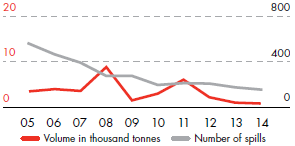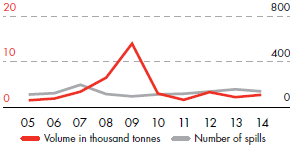Spills – Operational [A]

[A] Over 100 kilograms.
Spills – Sabotage [A]

[A] Sabotage- and theft-related spills over
100 kilograms.
Shell has clear requirements and procedures to prevent operational spills. We have ongoing programmes in place to maintain and improve our facilities and pipelines. However, spills still occur for reasons such as operational failure, accidents or unusual corrosion.
In 2014, we achieved our lowest level of recorded operational spills. The volume of operational spills of oil and oil products amounted to 0.7 thousand tonnes, down from 0.9 thousand tonnes in 2013. The number of operational oil spills also decreased in 2014 to 153, down from 174 in 2013. We continue to investigate and learn from all spills to improve our performance. We continue to invest in improving the reliability and maintenance of our facilities to help reduce operational spills.
In January 2015, Shell Petroleum Development Company announced a £55 million settlement agreement with the Bodo community in Nigeria in respect of two operational spills in 2008. We had previously accepted that the total volume of oil released as a result of the two operational spills is likely to have exceeded the estimates of the Joint Investigation Visits (see “Spill prevention and response”). However, given the degree of uncertainty in estimating the additional amount that might have been released, we have not restated our reported 2008 operational spill figure.
In 2014, sabotage and oil theft remained a significant cause of spills. Although the number of spills decreased to 139 from 157 in 2013, the volume of these spills increased to 2.7 thousand tonnes in 2014 from 2.2 thousand tonnes in 2013. See “Spill prevention and response” for more information on spills in Nigeria.
Our spill volumes do not include hydrocarbons present in controlled or regulated discharges to surface water. In 2014, hydrocarbons discharged to surface water were 0.9 thousand tonnes, down from 1.0 thousand tonnes in 2013.




